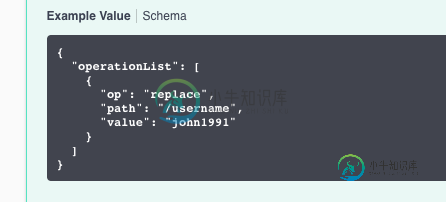如何在swagger文档中显示多个示例?
在我的REST API补丁操作中,我使用的是v3swagger-annotation:2.0.6
我试图为我的补丁操作patch/users/id添加更多的示例作为swagger模式。
请求主体:
{
"operationList": [
{
"op": "replace",
"path": "/username",
"value": "john1991"
}
]
}
目前我有以下类的请求模型。
public class UserPatchOp extends PatchOperation {
@Override
@Schema(description = "some description", example = "replace", required = true)
public PatchOperator getOp() {
return super.getOp();
}
@Override
@Schema(description = "some description", example = "/username", required = true)
public String getPath() {
return super.getPath();
}
@Override
@Schema(description = "some description", , example = "john1991", required = true)
public Object getValue() {
return super.getValue();
}
}
在PatchOperation.java中
public class PatchOperation {
/**
* {@link PatchOperator} operation to be performed
*/
@Schema(description = "Operation to be performed", required = true)
@JsonProperty
@NotNull
private PatchOperator op;
@Schema(description = "Path to target where operation will be performed", required = true)
@JsonProperty
@Pattern(regexp = "/([/A-Za-z0-9~])*-*", message = "Invalid path. Please follow regex pattern")
private String path;
@Schema(description = "Value used by operation")
@JsonProperty
private Object value;
public PatchOperation() {
}
}

{
"operationList": [
{
"op": "replace",
"path": "/username",
"value": "john1991"
},
{
"op": "remove",
"path": "/description"
},
{
"op": "add",
"path": "/memberships"
"value":["1224","8907"]
}
]
}
@补丁
@Path("users/{id}")
@Consumes({MediaType.APPLICATION_JSON, APPLICATION_JSON_PATCH_JSON})
@ApiResponses(value = {
@ApiResponse(responseCode = "200", description = MessageConstants.OK, content = @Content(schema = @Schema(implementation = UserInfo.class))),
@ApiResponse(responseCode = "500", description = MessageConstants.SERVER_ERROR, content = @Content(schema = @Schema(implementation = RestError.class))),
@ApiResponse(responseCode = "400", description = MessageConstants.BAD_REQUEST, content = @Content(schema = @Schema(implementation = RestError.class))),
@ApiResponse(responseCode = "401", description = MessageConstants.UNAUTHORIZED, content = @Content(schema = @Schema(implementation = RestError.class))),
@ApiResponse(responseCode = "404", description = MessageConstants.NOT_FOUND, content = @Content(schema = @Schema(implementation = RestError.class)))})
public Response updatePartialUser(
@Parameter(description = "User Id", required = true) @PathParam("id") String id,
@Parameter(description = "User Update Info", required = true) @Valid PatchOperations<UserPatchOperation> operationList) {
有没有办法,我可以为getOP、getPath和getValue方法添加多个示例?谢谢你。
共有1个答案
可以创建一个方法可以返回的多个响应示例,但也可以为一个响应代码只做一个示例。
@Operation(description = "Retrieves status of application",
responses = {
@ApiResponse(responseCode = "200",
description = "Everything works fine.",
content = @Content(mediaType = "application/json",
examples = @ExampleObject(value = "{\n" +
" \"success\" : true,\n" +
" \"message\" : \"OK\"\n" +
"}"))),
@ApiResponse(responseCode = "500",
description = "Application not working properly",
content = @Content(mediaType = "application/json",
examples = @ExampleObject(value = "{\n" +
" \"success\" : false,\n" +
" \"message\" : \"Application not working properly\"\n" +
"}")))
})
@GetMapping("haproxy")
ResponseEntity<BaseResponse> getHaProxy();
我不确定这是否是你想要的,但我看不到其他的方式。
请记住,大摇大摆的文档应该以一种有人能够连接到您的api并执行某些操作的方式进行。您不需要在那里提供太多的响应。这是用于rest方法的选项。OPTIONS方法基本上是一个GET,它不需要任何参数,响应时将返回关于某个方法可以做什么以及请求/响应是什么的完整信息。这里有更好的解释:RESTful API方法;头和选项
@Operation(description = "Creates a User",
requestBody = @io.swagger.v3.oas.annotations.parameters.RequestBody(description = "Request examples",
content = @Content(examples = {
@ExampleObject(name = "doing weird stuff", value = "http://localhost:7080"),
@ExampleObject(name = "doing weirdest stuff", value = "{\n\"test\":\"12\"\n}"),
})),
responses = {
@ApiResponse(responseCode = "200",
description = "Everything works fine.",
content = @Content(mediaType = "application/json",
schema = @Schema(implementation = UserResponse.class))),
@ApiResponse(responseCode = "404",
description = "Not found",
content = @Content(mediaType = "application/json",
examples = @ExampleObject(value = "{\"success\":false,\"message\":\"That shop or API version is not accessible yet\",\"httpStatus\":\"NOT_FOUND\"}"))),
@ApiResponse(responseCode = "500",
description = "Something went wrong",
content = @Content(mediaType = "application/json",
schema = @Schema(implementation = SomeBasicResponse.class)))
})
@Parameters({
@Parameter(in = ParameterIn.HEADER, name = "url",
content = @Content(schema = @Schema(type = "string", defaultValue = "localhost:7080")))
})
@PostMapping
ResponseEntity<UserResponse> createUser(@RequestHeader(name = "login", required = false) String login,
@RequestHeader(name = "password") String password,
@RequestBody UserRequest request);
我希望那就是你要找的。
-
当我将示例添加到我的swagger文档中并在swagger编辑器上进行测试时,它在任何地方都不会显示。有人能给我举一个例子,说明在什么地方有多个例子吗? 它来自:https://swagger.io/docs/specification/adding-examples/ 以下是一个yaml示例,它在在线招摇过市编辑器上不显示任何:
-
我已经将swagger与django rest框架集成在一起,但是swagger文档没有创建一个输入框来发布post请求的数据。 我的解析器设置, }
-
我正在使用Swagger OpenAPI规范工具,我在其中一个定义中有一个字符串数组属性,如下所示: 我的API生成JSON结果,因此对于上述对象,以下结果出现在响应中: 尝试逗号分隔字符串,如下所示: 预期结果为: 但是编辑器显示错误。"缩进错误" 我想给示例标签赋予多个值,有什么办法吗? 更新 下面的用户Helen给出了正确答案,我有缩进问题,因此有嵌套数组(2d数组) 正确方式: 我的方式(
-
我想使用JText区或JTextPane作为代码更改播放器,代码更改和插入符号移动记录在文本文件中。但问题是,它是从支持多选的编辑器记录的,因此一次有多个插入符号位置。 可以在JTextArea或JTextPane中显示多个carets吗? 我尝试使用JTextPane并将代码呈现为超文本标记语言,并插入了一些
-
swagger展示目标效果 后台管理 用户管理 a接口 b接口 文章管理 c接口 d接口 现在效果 后台管理 a接口 b接口 c接口 d接口 用户管理 a接口 b接口 文章管理 c接口 d接口 代码 问: 可以实现目标效果吗,如何实现.
-
我创建了yaml文件(openapi 3.0.0格式)作为API的文档。我想在应用程序运行的URL处显示这个(静态)swagger-ui yaml文件。类似于http://localhost:8080/swagger-ui。其中显示了yaml文件的图形表示(与此处相同)。Yaml文件放在Project的根文件夹中。 我在Java11,springboot 2.1.5上运行应用程序,用Maven构建

